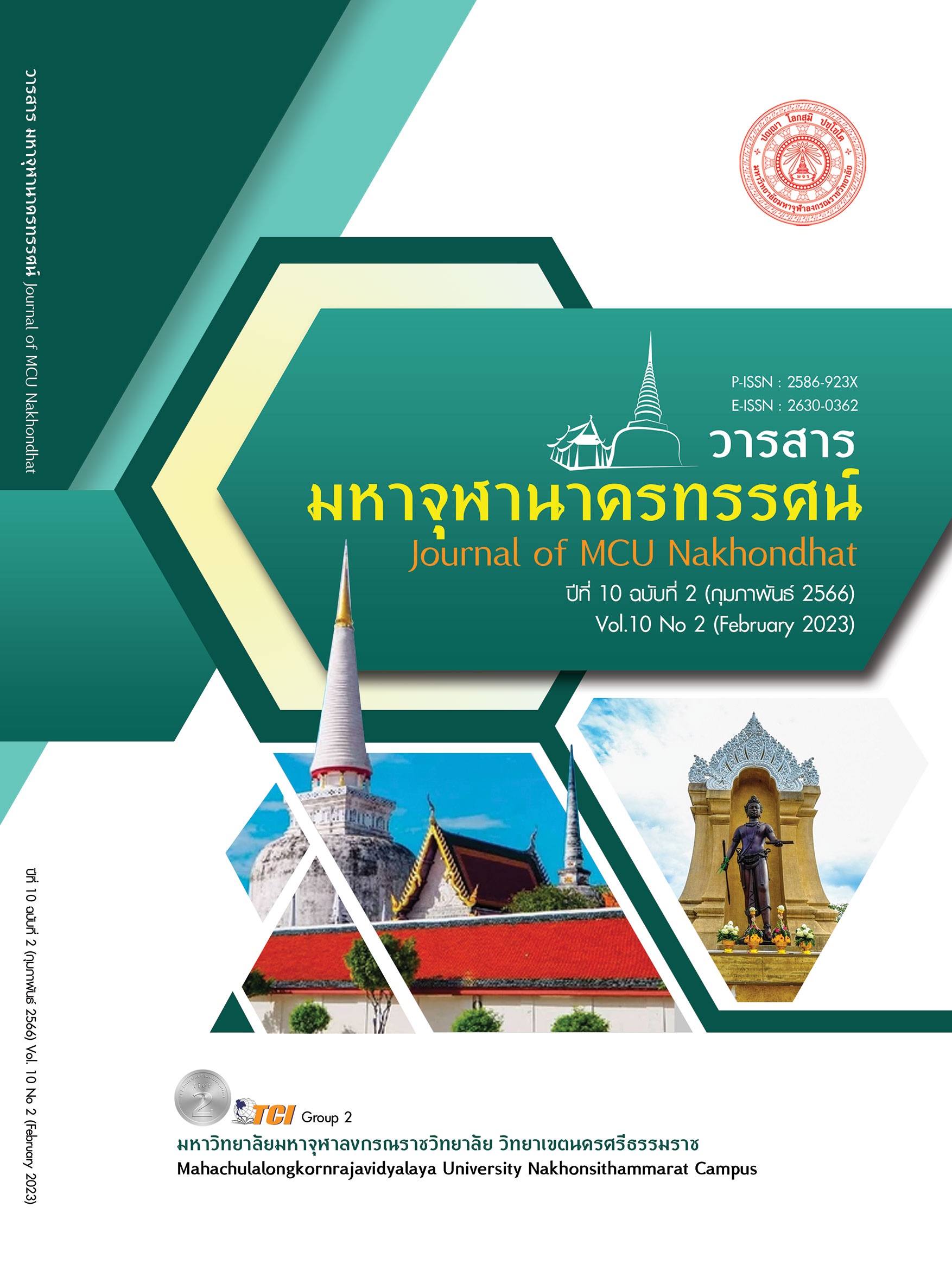ATTITUDES IN THE LAW OF KARMA TOWARDS THE 5 PRECEPTS
Main Article Content
Abstract
This article presents the attitudes of the law of karma towards the 5 precepts, which is the basis of morality and complete ethics of humanity. The objective of displaying the attitudes of the law of karma towards the 5 precepts, it integrates and connects with the moral principles in Buddhism, both the cause and effect of karma. There are 3 attitudes found in this study, namely 1) The attitudes that can be divided into specific key point are the point of good deeds that give good results and bad deeds which give bad results.
It viwes as when a person commits any acts, whether good or bad deed (Kusala and Akusala), it will have the affect of his actions. 2) The attitudes of karma in the 5 precepts that is done or expression that found as Physical karma (Kaya Krama) with to refrain from taking life, taking what is not freely given, sexual misconduct, and behaviors abstaining from telling a lie. In which the viewpoint of physical karma determines the behavior of expression by refraining abstain from bodily misconduct and dishonest discourses, but nevertheless the five precepts also have links to behavior with intent to refrain as conspiracy caused by the mind 3) The attitudes of the law of karma is the result of both good and evil karma. Both things are a cause of good deeds and bad deeds. That will be light, fast, slow, depending on the cause of action or the effect of the karma intended to be set so it linked to the karma that will occur due to 4 factors, namely Kurukarma (weighty karma), Phulakarma (habitual karma), Asannakarma (death threshold karma), and Kthattakarma (reserve karma)
Article Details

This work is licensed under a Creative Commons Attribution-NonCommercial-NoDerivatives 4.0 International License.
References
ทองหยก เลียงพิบูลย์. (2558). กฎแห่งกรรม ฉบับสมบูรณ์ เรามีกรรมเป็นของตน เล่ม 1. กรุงเทพมหานคร: ธรรมสภาและสถาบันบันลือธรรม.
พระธรรมกิตติวงศ์ (ทองดี สุรเตโช). (2548). พจนานุกรมเพื่อการศึกษาพุทธศาสน์ ชุดคำวัด. กรุงเทพมหานคร: ธรรมสภาและสถาบันบันลือธรรม.
พระพุทธโฆสเถระ. (2546). คัมภีร์วิสุทธิมรรค แปลและเรียบเรียง สมเด็จพระพุฒาจารย์ (อาจ อาสภมหาเถร). (พิมพ์ครั้งที่ 4). กรุงเทพมหานคร: บริษัทประยูรวงศ์พริ้นติ้ง จำกัด.
พระมหาเอกชัย สุชโย (คำลือ). (2560). ศึกษาวิเคราะห์มิจฉาทิฏฐิและสัมมาทิฏธิในพุทธปรัชญาเถรวาท. ใน วิทยานิพนธ์ศาสนศาสตรมหาบัญฑิต สาขาวิชาพุทธศาสนาและปรัชญา. มหามกุฏราชวิทยาลัย.
มหาวิทยาลัยมหาจุฬาลงกรณราชวิทยาลัย. (2537). พระไตรปิฎกภาษาบาลี ฉบับมหาจุฬาลงกรณราชวิทยาลัย. กรุงเทพมหานคร: โรงพิมพ์มหาจุฬาลงกรณราชวิทยาลัย.
มหาวิทยาลัยมหาจุฬาลงกรณราชวิทยาลัย. (2539). พระไตรปิฎกภาษาไทย ฉบับมหาจุฬาลงกรณราชวิทยาลัย. กรุงเทพมหานคร: โรงพิมพ์มหาจุฬาลงกรณราชวิทยาลัย.
วศิน อินทสระ. (2556). อธิบายมิลินทปัญหา. (พิมพ์ครั้งที่ 3). กรุงเทพมหานคร: สำนักพิมพ์ธรรมดา.
สมเด็จพระพุทธโฆษาจารย์ (ป.อ.ปยุตฺโต). (2561). พจนานุกรมพุทธศาสน์ ฉบับประมวลศัพท์. (พิมพ์ครั้งที่ 31). กรุงเทพมหานคร: บริษัท สหธรรมิก จำกัด.
ไสว มาลาทอง. (2542). การศึกษาจริยธรรม สำหรับนักเรียน นิสิต นักศึกษา นักบริหาร นักปกครองและประชาชน ผู้สนใจทั่วไป. (พิมพ์ครั้งที่ 1). กรุงเทพมหานคร: โรงพิมพ์การศาสนา.


